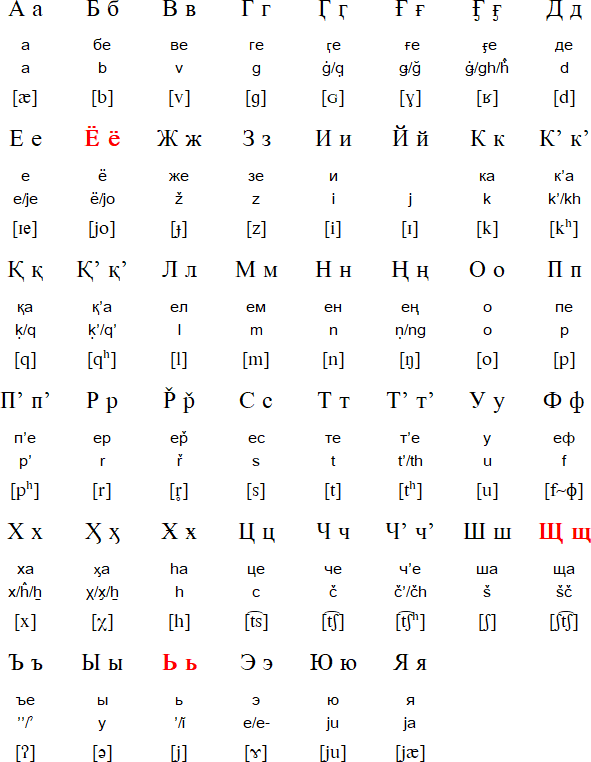Nivkh is a language isolate spoken by about 1,000 people in Outer Manchuria along the Amgun and Amur rivers and part of Sakhlin Island. There are three main dialects: Amur, East Sakhlin and North Sakhlin, with only limited mutally intelligibilty between them.
Nivkh is also known as Gilyak. It is unrelated to any other language, though is sometimes included in the Paleosiberian group of languages for convenience. Nivkhs living along the Amur river call themselves Nivh, while those on Sakhlin are known as N'ivhgn-N'igvn, meaning 'man'. The term Gilyak is the name given to the Nivkhs by the neighbouring Manchus.
Nivkh first appeared in writing in the 1880s in a Nivkh-Nanai primer compiled by a missionary. A Latin-based alphabet for Nivkh was used between 1931 and 1953, when a switch was made to the Cyrillic alphabet.

The letters Ё, Щ and Ь are only used for Russian loanwords.
Download an alphabet chart for Nivkh (Excel)
Information about Nivkh pronunciation compiled by Wolfram Siegel
Сик нивгун куғытӻарта, пʼинамад яймта адяй правоғир̌ пʼӊафқ-ӊафқғир̌ салӻата ӿат пантадғун.
Sik nivgun kuğygharta, p’inamad jajmta adjaj pravoğiř p’ngafq-ngafqğiř salghata hat pantadğun.
Source: https://unicode.org/udhr/d/udhr_niv.html
Information about Nivkh | Numbers
Information about the Nivkh language and people
http://en.wikipedia.org/wiki/Nivkh_language
http://www.eki.ee/books/redbook/nivkhs.shtml
http://www.peoples.org.ru/eng_nivh.html
Sound Materials of the Nivkh Language
http://ext-web.edu.sgu.ac.jp/hidetos/HTML/SMNStitle.html
Abaza, Abkhaz, Adyghe, Aghul, Akhvakh, Akkala Sámi, Aleut, Altay, Alyutor, Andi, Archi, Assyrian / Neo-Assyrian, Avar, Azeri, Bagvalal, Balkar, Bashkir, Belarusian, Bezhta, Bosnian, Botlikh, Budukh, Bulgarian, Buryat, Chamalal, Chechen, Chelkan, Chukchi, Chulym, Chuvash, Crimean Tatar, Dargwa, Daur, Dolgan, Dungan, Enets, Erzya, Even, Evenki, Gagauz, Godoberi, Hinukh, Hunzib, Ingush, Interslavic, Itelmen, Juhuri, Kabardian, Kaitag, Kalderash Romani, Kalmyk, Karaim, Karakalpak, Karata, Karelian, Kazakh, Ket, Khakas, Khanty, Khinalug, Khorasani Turkic, Khwarshi, Kildin Sámi, Kili, Komi, Koryak, Krymchak, Kryts, Kubachi, Kumandy, Kumyk, Kurdish, Kyrgyz, Lak, Lezgi, Lingua Franca Nova, Lithuanian, Ludic, Macedonian, Mansi, Mari, Moksha, Moldovan, Mongolian, Montenegrin, Nanai, Negidal, Nenets, Nganasan, Nivkh, Nogai, Old Church Slavonic, Oroch, Orok, Ossetian, Pontic Greek, Romanian, Rushani, Russian, Rusyn, Rutul, Selkup, Serbian, Shor, Shughni, Siberian Tatar, Sirenik, Slovio, Soyot, Tabassaran, Tajik, Talysh, Tat, Tatar, Teleut, Ter Sámi, Tindi, Tofa, Tsakhur, Tsez, Turkmen, Tuvan, Ubykh, Udege, Udi, Udmurt, Ukrainian, Ulch, Urum, Uyghur, Uzbek, Veps, Votic, Wakhi, West Polesian, Xibe, Yaghnobi, Yakut, Yazghulami, Yukaghir (Northern / Tundra), Yukaghir (Southern / Kolyma), Yupik (Central Siberian)
Languages written with the Latin alphabet
Adaizan, Ainu, Basque, Burushaski, Candoshi-Shapra, Chitimacha, Eskayan, Hadza, Haida, Karuk, Kawésqar, Keres, Kuot, Kusunda, Kutenai, Natchez, Nihali, Nivkh, Páez, Purepecha, Sandawe, Seri, Sumerian, Tartessian, Ticuna, Tiwi, Tonkawa, Tunica, Urarina, Waorani, Warao, Wardaman, Washo, Yaghan, Yele, Yuchi/Euchee, Zuni
Page last modified: 10.06.24
[top]
You can support this site by Buying Me A Coffee, and if you like what you see on this page, you can use the buttons below to share it with people you know.

If you like this site and find it useful, you can support it by making a donation via PayPal or Patreon, or by contributing in other ways. Omniglot is how I make my living.
Note: all links on this site to Amazon.com, Amazon.co.uk
and Amazon.fr
are affiliate links. This means I earn a commission if you click on any of them and buy something. So by clicking on these links you can help to support this site.
[top]